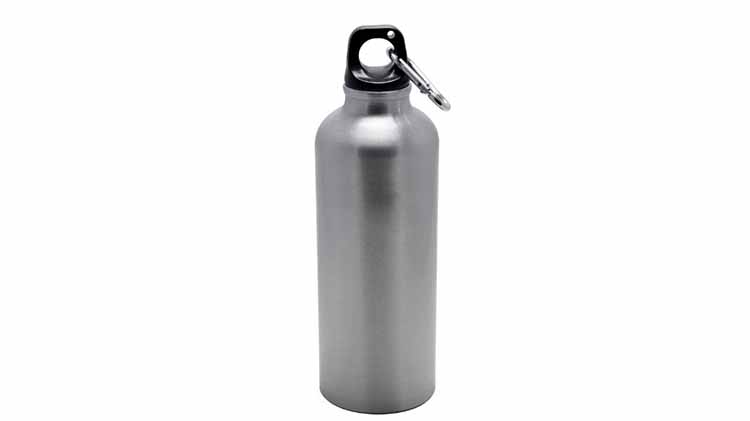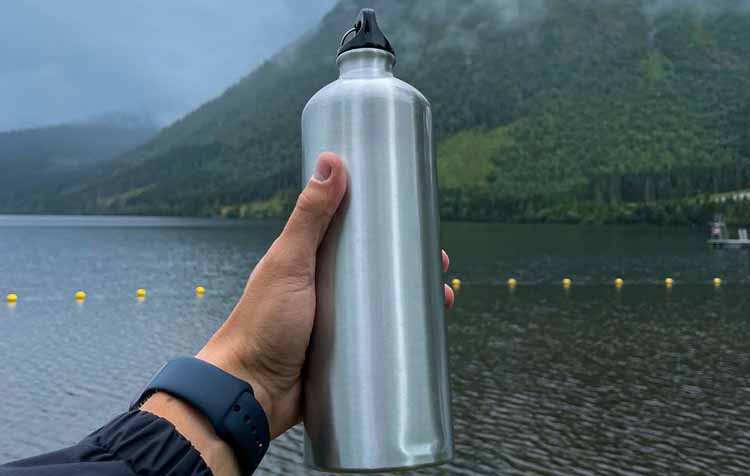If you’ve ever noticed a strange smell coming from your aluminum water bottle, that unpleasant odor is usually caused by bacteria, mold, or leftover drink residue lingering inside. Even cleaning products can leave behind bad smells if not rinsed properly.
Over time, these smells can affect the taste of your water and may even pose health risks. However, you can keep your bottle fresh with simple cleaning hacks and proper storage practices.
In this article, you’re going to get a detailed answer to “Why does my aluminum water bottle smell? What should I do to fix the smelly bottle?” and so on!
5 Reasons Why Your Aluminum Water Bottle Smells Bad
Let’s take a closer look at the most common reasons your aluminum water bottle might have a bad odor.
1. Bacteria and Mold Growth
One of the biggest villains behind a smelly water bottle is bacteria and mold buildup. If you often store your bottle while it’s damp or forget to clean it, mold can start growing in hidden spots, especially around the cap and silicone seals. A musty or sour odor is a clear sign of this issue.
How to Fix It:
- Look at the bottle closely for any black, brown, or green spots, especially near the lid and silicone ring.
- Wash the bottle thoroughly using warm, soapy water.
- Use a mixture of baking soda and vinegar to kill bacteria naturally.
- Let the bottle dry completely before closing the lid.
Prevention Tip:
Always rinse and empty your bottle after use, and store it with the lid off to let it dry properly.
2. Leftover Beverage Residue
If you use your aluminum bottle for drinks other than water, like coffee, tea, or fruit juices, it can lead to persistent odors. Stale coffee, in particular, can leave a strong, unpleasant smell that lingers even after washing.

How to Fix It:
- Fill your bottle with a mixture of warm water and a tablespoon of baking soda. Let it sit overnight.
- Use a bottle brush to scrub the interior thoroughly.
- Rinse well to remove any lingering flavors or scents.
Prevention Tip:
Avoid leaving flavored drinks in your bottle for too long. Always clean the bottle immediately after using it for anything other than water.
3. Stale or Stagnant Water
If you’ve ever left water sitting in your bottle for too long, you may have noticed an unpleasant, swampy smell when you finally open it. This is caused by bacteria that thrive in still water.
How to Fix It:
- Empty and rinse your bottle daily to prevent bacteria from growing.
- If your bottle already smells bad, wash it with hot, soapy water and let it air dry completely.
- For deeper cleaning, fill the bottle with a mixture of white vinegar and water, let it sit for a few hours, then rinse.
Prevention Tip:
Never leave water sitting in your bottle for more than a day. If you’re not using the bottle, keep it empty and dry.
4. Leftover Cleaning Product Smell
Sometimes, your bottle might still smell bad, even after cleaning. This happens when soap or bleach leaves behind a strong chemical odor that gets trapped inside the bottle.
How to Fix It:
- Rinse your bottle thoroughly after washing it to remove any soap residue.
- If the smell persists, fill the bottle with warm water and a tablespoon of baking soda, then let it sit for a few hours.
- Rinse well with clean water to remove any leftover cleaning product scents.
Prevention Tip:
Use mild, unscented soaps or natural cleaners like vinegar and baking soda to wash your bottle.
5. Metallic or Chemical Smell
A strong metallic smell can occur if acidic drinks like juice or soda react with the aluminum lining of your bottle. Over time, this can lead to an unpleasant odor and even affect the taste of your drinks.
How to Fix It:
- If your water bottle has a metallic smell, try soaking it in a mixture of water and lemon juice for a few hours before rinsing.
- Always drink and replace the water in your bottle daily to prevent odor buildup.
Prevention Tip:
If you need to store acidic beverages for a long time, consider using a high-quality stainless steel bottle instead of aluminum, as it resists odors better.
What Happens If You Drink from a Smelly Aluminum Water Bottle?
The odor in your aluminum water bottle is often a sign of bacteria, mold, or other contaminants that have built up inside the bottle. Here’s what could happen if you continue using a smelly aluminum water bottle without properly cleaning it:

1. You Might Ingest Harmful Bacteria
A bad smell in your bottle is mostly caused by bacteria or mold growing inside. If you drink from it, you could ingest harmful microorganisms that may lead to:
- Mild stomach discomfort: Nausea or an upset stomach due to consuming bacteria.
- Food poisoning-like symptoms: Some bacteria can cause vomiting, diarrhea, or stomach cramps.
- Fungal infections: Mold exposure can sometimes lead to allergic reactions or breathing issues, especially for sensitive people.
Solution: If your bottle smells musty, clean it thoroughly with hot water, soap, and baking soda before using it again.
2. The Taste of Your Drinks Will Be Affected
A smelly bottle can make your water or beverages taste awful. The odor from mold, stagnant water, or leftover drink residue (like coffee or juice) can seep into your fresh water and make it taste metallic, sour, or just unpleasant.
Solution: Rinse your bottle thoroughly after every use, especially if you drink flavored beverages.
3. Chemical Residue from Cleaning Products Might Be Present
If your bottle smells like chemicals or soap, it could mean cleaning products weren’t fully rinsed out. Drinking from a bottle with leftover detergent or bleach can cause:
- A soapy or bitter taste in your water.
- Irritation in your throat or stomach if the cleaning product is too strong.
Solution: Always rinse your bottle multiple times with clean water after washing to remove any soap or cleaning product residue.
4. You Could Be Drinking Contaminated Water
If the smell is due to stagnant water sitting in the bottle for too long, bacteria may have multiplied inside. Stagnant water can harbor bacteria like Pseudomonas or E. coli. In extreme cases, it can cause infections or digestive problems.
Solution: Never leave water sitting in your bottle for more than a day. If it smells bad, empty it and wash it before refilling.
5. Your Bottle Might Have Metal Leaching Issues
If your aluminum bottle smells metallic, it could indicate that acidic drinks (like juice or soda) have reacted with the metal lining. Over time, this could cause tiny amounts of metal to leach into your drink. Although most aluminum bottles have a protective coating, damaged or low-quality ones may expose you to more metal.
Solution: Avoid storing acidic drinks in aluminum bottles for long periods.
Verdict
Hopefully, you’ve got the answer to your question- Why does my aluminum water bottle smell?
Bacteria, mold, leftover drinks, or cleaning product residue usually cause a smelly aluminum water bottle. Regular cleaning, proper drying, and avoiding long-term water storage can help prevent bad odors.
If your bottle already smells, deep clean it with baking soda, vinegar, or warm soapy water.

